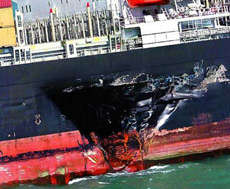
Eight days and nights of clean-up efforts after the worst oil leak ever in Chinese waters, the aftermath of a collision between two foreign ships, have finally paid off.
So far, hundreds of tons of waste oil and polluted water have been cleared up.
A large area of oil spills has been cleaned thanks to the prompt and proper operation launched just two hours after the accident.
This is also the first time that China has put its oil-spill emergency plan into effect, which has proved its efficiency after this accident, Xu Guoyi, Deputy Director of Maritime Safety Administration under the Ministry of Communication was quoted by China Central Television (CCTV) as saying.
"Our priority is to be efficient in order to minimize the damage done to wildlife and the environment," Wang Jihong, Director of the Department of Navigable Waters Management of Guangdong Maritime Safety Administration told China Daily.
"Efforts have been made to prevent the pollution from extending to the waters of the neighbouring Hong Kong and Macao special administrative regions and stop the oil from reaching the coasts of surrounding islands," said Wang, one of the first people to arrive at the scene of the accident.
The oil-cleaning team, headed by the Ministry of Communications and joined by the Guangdong Maritime Safety Administration and other departments, dispatched hundreds of vessels and staff to take part in the operation.
Several helicopters were also used to survey the scene and report the latest movement of the oil spill to the task force.
Wang said that oil-absorbent rolls and skimmer equipment were mainly used to clean up the spills.
The vessels contained the spill with booms and collected it from the water's surface using the skimmer equipment.
However, since booms and skimmers are considered less effective when deployed in strong winds and on high seas, oil- absorbent rolls played a significant part in this operation.
But oil-absorbent rolls are only more convenient when they are being pulled by smaller vessels. The government has asked fishermen in the neighbouring cities and islands to join the operation, said Wang.
"To encourage more fishing boats to join us, we've paid 5,000 yuan (US$602) per day and 2,000 yuan (US$240) for every ton of oil they recover," said Wang
As a result, more than 100 local fishing boats have participated in the operation, stopping further pollution.
The clash happened at 9:35 pm on December 7 when two foreign-registered ships collided about 8 nautical miles away from the mouth of the Pearl River and near the Danjiang Island.
The Hvundai Advance, registered in Panama, was sailing from Shenzhen to Singapore when it clashed with the German ship Mscilona that was going from Shenzhen to Shanghai.
A fuel storehouse of the 300-metre-long, 75,500-ton Mscilona broke and started leaking heavy fuel oil. The 182-metre-long, 21,000-ton Hvundai Advance was also damaged.
The head-on collision resulted in the spillage of more than 1,200 tons of heavy fuel oil. The leaking oil soon formed a 9-nautical-mile-long and 10 to 200-metre-wide oil belt near the mouth of the Pearl River in South China's Guangdong Province.
The clean-up turned out to be very hard as the wind became especially strong and the waves surged to a height of 3 metres.
"The workers found it difficult to stand up and kept vomiting on board. But we all knew that there was no time to lose. We had to go on," said Wang.
To make matters worse, the leak involved heavy fuel oil, which is very viscous, severely threatening the sea ecology system and increasing the clean-up costs.
"Heavy fuel oil is hard to clean up once it reaches the coast," Liu Hong, a researcher with the Ministry of Communications was quoted by CCTV as saying. "Sea birds wouldn't be able to look for food nor fly if their wings were tainted by the heavy oil. Fish and other sea life would be affected too."
Liu has cited an oil spill near South African waters as an example. A total of 1,800 tons of oil spilled out. Statistics showed that the accident has resulted in the deaths of 8,000 sea birds and 13,000 sea birds were contaminated.
Meanwhile, oil-absorbent materials have been running out in Guangdong Province due to the large demand. "So, oil-absorbent rolls have to be sent from the Shanghai and Yantai emergency centres," recalled Xu from the maritime safety administration.
Xu admitted that China has not established an emergency centre to deal with large-scale oil spills to date, and called for more organizations to participate in the emergency system together with the government.
The huge cost of cleaning the oil spills, estimated to exceed 50 million yuan (US$6.04 million), have put pressure on the Guangdong Maritime Safety Administration.
Apart from the direct cost of the clean-up, damage from oil spills to the aquatic fauna and fishing industry also costs a huge amount of money.
Xu reckoned that the cost of operation and the losses could be over 100 million yuan (US$11.95 million).
(China Daily December 17, 2004)
|

